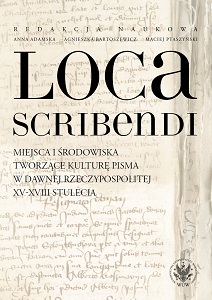Protestancka parafia jako miejsce pisma: Rzesza i Rzeczpospolita na przełomie XVI i XVII w.
The Protestant parish as a place of the creation of written texts: the German Reich and the Polish-Lithuanian Commonwealth in the 16th and 17th Centuries
Author(s): Maciej Ptaszyński
Subject(s): Middle Ages, 6th to 12th Centuries, 13th to 14th Centuries, 15th Century, 16th Century, 17th Century, 18th Century
Published by: Wydawnictwa Uniwersytetu Warszawskiego
Keywords: writing community; consistory; notary public; writer; writing; office; books; 15th-18th century; writing culture
Summary/Abstract: The article discusses the role of the written word in the life of Protestant clergymen and their parishes, sketching the connection between the Protestant (especially Lutheran) confession and written culture by comparing the daily functioning of parishes in the Polish-Lithuanian Commonwealth and in the German lands, especially in the Lutheran principalities of Pomerania. The possessing of vernacular translations of the Bible has been compared, attitudes towards a university culture which expressed the essence of literacy, and the presence of symbols and gestures referring to the written word in the daily life of ministers of the Church. Contrary to ‘official’ declarations, the use of the vernacular Bible was very limited. Nevertheless, devotion to the Gospel can be seen in the area of theological references and values. Written culture, in its humanist and academic dimensions, became part of the professional ethos of Protestant ministers. This paradoxically led to many conflicts with the community of believers.
- Page Range: 183-201
- Page Count: 19
- Publication Year: 2017
- Language: Polish
- Content File-PDF

